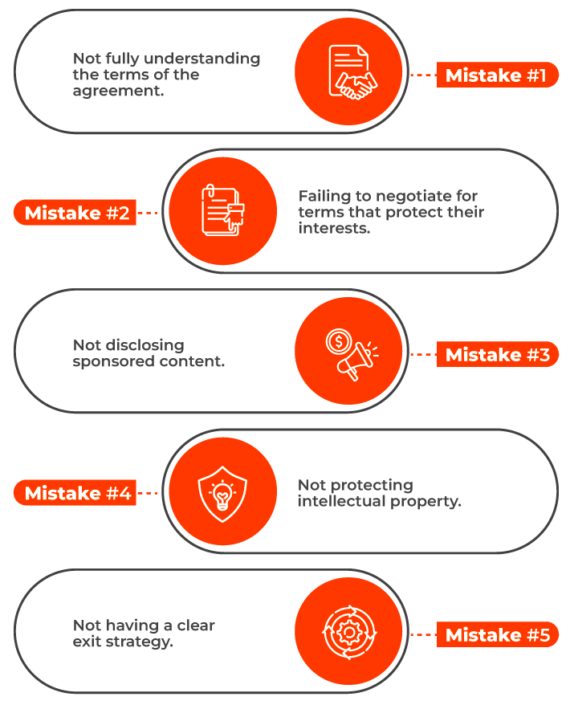How to Avoid Common Digital Marketing Mistakes
Digital marketing is an ever-evolving field with numerous opportunities and challenges. While it offers the potential to reach a vast audience and drive business growth, it’s also fraught with common mistakes that can hinder your success. In this article, we’ll explore strategies to avoid these pitfalls and achieve more effective digital marketing campaigns.
Table of Contents:
- Understanding the Common Mistakes
- Setting Clear Objectives
- Audience Research and Segmentation
- Quality Over Quantity: Content Matters
- Consistent Branding Across Platforms
- The Power of SEO and Keywords
- Data-Driven Decision-Making
- Social Media Strategy
- Email Marketing Best Practices
- Testing and Optimization
- Staying Updated with Trends
- Monitoring and Analytics Tools
- Avoiding Over-Automation
- Budget Management
- Ethical Considerations
- Collaboration and Learning
- Crisis Management Preparedness
- Staying Customer-Centric
- Seeking Professional Guidance
- Continuous Improvement
Let’s dive into each of these strategies to help you avoid common digital marketing mistakes and optimize your campaigns.
1. Understanding the Common Mistakes
Learning from Others
Begin by studying common digital marketing mistakes that others have made. This knowledge can help you avoid repeating their errors and save resources.
Before diving into your own digital marketing campaigns, it’s essential to study and comprehend the common mistakes that many marketers have made in the past. Here’s why this step is crucial:

1.1. Avoiding Costly Errors
By examining the missteps of others, you can steer clear of costly and time-consuming mistakes that could negatively impact your campaigns. Learning from their experiences allows you to sidestep pitfalls that have derailed even seasoned marketers.
1.2. Identifying Patterns
Analyzing common mistakes helps you identify patterns and recurring issues. These patterns might include overspending on ineffective ads, neglecting audience research, or failing to adapt to changing algorithms on social media platforms.
1.3. Staying Proactive
Understanding common mistakes keeps you proactive. It encourages you to consider potential pitfalls in advance and develop strategies to mitigate risks. Proactivity is key to avoiding setbacks in the fast-paced world of digital marketing.
1.4. Continuous Improvement
Marketers who actively seek to understand past mistakes are more likely to engage in a cycle of continuous improvement. They apply lessons learned to refine their strategies, resulting in increasingly effective campaigns over time.
1.5. Competitive Advantage
Knowing what not to do can give you a competitive advantage. It allows you to differentiate yourself from competitors who might fall into the same traps, enabling you to stand out in the digital landscape.
1.6. Data-Driven Decision-Making
Studying past mistakes encourages data-driven decision-making. Instead of relying solely on intuition or assumptions, you can base your strategies on evidence and analysis, leading to more informed choices.
1.7. Adaptability
Digital marketing is an ever-evolving field. Understanding common mistakes helps you become more adaptable. You’re better prepared to adjust your strategies when new challenges or trends arise.
In summary, understanding the common mistakes in digital marketing serves as a valuable foundation for your campaigns. It allows you to avoid errors, identify patterns, stay proactive, continuously improve, gain a competitive edge, make data-driven decisions, and remain adaptable in an ever-changing digital landscape. By learning from the experiences of others, you set yourself up for success in your digital marketing endeavors.
2. Setting Clear Objectives
Define Your Goals
Start each campaign with clear, measurable objectives. Whether it’s brand awareness, lead generation, or sales, having defined goals ensures you stay on track.
3. Audience Research and Segmentation
Know Your Audience
Invest time in understanding your target audience’s demographics, preferences, and pain points. Segmentation allows you to tailor messages effectively.
4. Quality Over Quantity: Content Matters
Valuable Content
Focus on creating high-quality, relevant content that resonates with your audience. Quality content builds trust and engagement.
5. Consistent Branding Across Platforms
Unified Branding
Maintain a consistent brand identity across all digital channels, including your website, social media, and email marketing.
6. The Power of SEO and Keywords
Search Engine Optimization
Optimize your website and content for search engines. Effective SEO strategies can boost your visibility in search results.
7. Data-Driven Decision-Making
Use Analytics
Leverage data and analytics tools to measure campaign performance and make data-driven decisions for improvements.
8. Social Media Strategy
Social Presence
Develop a well-thought-out social media strategy. Each platform requires a different approach, so tailor your content accordingly.
9. Email Marketing Best Practices
Effective Email Campaigns
Adhere to best practices in email marketing, such as segmenting your lists, personalizing content, and optimizing for mobile.
10. Testing and Optimization
Continuous Improvement
Regularly test different strategies, messages, and ad formats. Optimize campaigns based on what works best.
11. Staying Updated with Trends
Industry Insights
Keep up with industry trends and algorithm changes on digital platforms. Adapt your strategies accordingly.
12. Monitoring and Analytics Tools
Track Performance
Utilize monitoring tools and analytics platforms to track real-time campaign performance.
13. Avoiding Over-Automation
Personal Touch
While automation is helpful, avoid over-automating customer interactions. Maintain a personal touch in your communications.
14. Budget Management
Effective Allocation
Manage your budget wisely, allocating resources to the most effective channels and campaigns.
15. Ethical Considerations
Ethical Marketing
Ensure your marketing practices are ethical, transparent, and respectful of user privacy.
16. Collaboration and Learning
Networking and Education
Collaborate with peers, attend industry events, and invest in ongoing learning to stay ahead.
17. Crisis Management Preparedness
Plan for the Unexpected
Have a crisis management plan in place to address any unforeseen issues promptly and professionally.
18. Staying Customer-Centric
Customer Focus
Always prioritize the needs and preferences of your customers in your marketing efforts.
19. Seeking Professional Guidance
Expert Help
Consider seeking guidance from digital marketing professionals or agencies when needed.
20. Continuous Improvement
Learn and Adapt
Digital marketing is an ever-changing field. Continuously learn, adapt, and refine your strategies.
In conclusion, avoiding common digital marketing mistakes requires a combination of careful planning, data analysis, ongoing learning, and a customer-centric approach. By implementing these strategies, you can optimize your digital marketing efforts, drive better results, and stay ahead in the competitive digital landscape.






